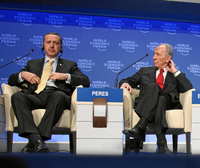At first sight, ideology readily suggests itself as the main explanation for Turkey's redefinition of its relations with Israel. After all, the gradual rift and impending breakdown of strategic relations between the two countries began once the moderately Islamist Justice and Development Party (AKP) rose to power in Turkey. Upon closer examination, however, other factors are more fundamental in accounting for the split. Simply put, Turkey no longer needs Israel.
This change is related less to the Turkish government's Islamic ideology and more to geopolitical trends and a concomitant shift in the global and regional balance of power. While ideology has certainly proved to be an important factor in this regard, it is more of an instrument than a determinant of Turkish statecraft. Israel is certainly a useful punching bag for Turkey in its pursuit of domestic and regional popularity. Ankara has not invented this approach, however. States, just as individuals, emulate successful behavior. In this regard, Turkey appears to have emulated the Iranian regime's use of the anti-Israel card to appeal to regional popular sentiment. Nevertheless, such an approach would not be cost-effective were it not for significant regional shifts that have made Turkey-Israel ties more of a liability to Ankara and less of a strategic asset.
The first of these shifts was Syria's decision in 1998 to end its support for the Kurdistan Workers' Party (PKK), a Kurdish guerilla movement to which Syria had provided aid and sanctuary since 1984. The move, which predated the emergence of the AKP in Turkey, was the result of Turkish military threats. Turkey was able to coerce Syria into abandoning the PKK in large part because Syria had lost its former global patron, the Soviet Union, and could no longer rely on a post-Soviet Russia embroiled in political instability and grappling with economic decay throughout the 1990s. Equally important in Damascus' strategic calculus was American and Israeli support for Turkey in the post-Cold War period.

